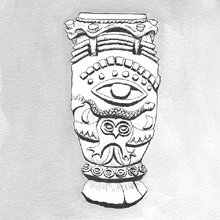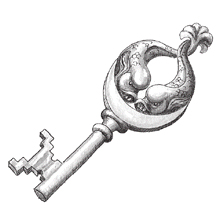The Choir Boats



FIRST EDITION
The Choir Boats © 2009 by Daniel A. Rabuzzi
Cover wood carving and chapter illustrations © 2009 by Deborah A. Mills
Wood carving photograph © 2009 by Shira Weinberger
Jacket design © 2009 by Erik Mohr
All Rights Reserved.
This book is a work of fiction. Names, characters, places, and incidents are either a product of
the author’s imagination or are used fictitiously. Any resemblances to actual events, locales,
or persons, living or dead, is entirely coincidental.
LIBRARY AND ARCHIVES CANADA CATALOGUING IN PUBLICATION
Rabuzzi, Daniel A. (Daniel Allen), 1959-
The choir boats / Daniel A. Rabuzzi ; editors: Alexander Savory & Sandra
Kasturi ; illustrators: Erik Mohr & Deborah Mills.
(Longing for Yount ; v. 1)
ISBN 978-0-9809410-6-7 (bound).--ISBN 978-0-9809410-7-4 (pbk.)
I. Savory, Brett Alexander, 1973- II. Kasturi, Sandra, 1966- III. Title.
IV. Series: Rabuzzi, Daniel A. (Daniel Allen), 1959- . Longing for Yount ; v. 1.
PS3618.A328C47 2009; 813’.6; C2009-903617-7
CHIZINE PUBLICATIONS
Toronto, Canada
www.chizinepub.com
Edited by Brett Alexander Savory
Copyedited and proofread by Sandra Kasturi
Converted to mobi and epub by Christine http://finding-free-ebooks.blogspot.com/
,
For notes to the text, and other background information on the
McDoons and Yount, see: www.danielarabuzzi.com
Dedicated to my two brothers, Matt and Doug, and my five nephews,
Nick, Patrick, Than, Terence, and James.

The young woman counted — “
Otu
,
abua
,
ato
,
ano
,
ise
,
isii
,
asaa
” —
using what remained to her of the secret language her mother had
learned from
her
father, the language they had used in the place
across the ocean when they did not want the white men with whips
to understand. “One, two, three, four, five, six, seven . . . we need
seven to succeed, seven to open the way.
Chi di
, there is still daylight
left, still time, but not much.”
She stood near dusk in a blind alley in Whitechapel on the verge
of the City of London. Distant notes drifted down from the sliver
of sky far above, bells tolling the Feast of the Epiphany on the first
Sunday in 1812. The young woman (little more than a girl, perhaps
sixteen years of age) pulled her worn-out sailor’s coat around her and
knotted her red kerchief against the cold. She scratched numbers on
the brick wall in front of her, deepening the grooves made hundreds
of times before. Staring at the numbers until the bricks faded, until
she could see deep into herself and beyond, the girl hummed.
Rooks flew over rooftops but she did not heed their calls. She was on the marches of
ala mmuo
, the realm of the spirits. There she met the
ancestors, the
ndichie
, who spoke of pride burnished under the sun, the
heart of courageous healing, the brown eye of wisdom. Today she went
farther than she ever had before, led on by the humming of a thousand
bees at a thousand bee-ships, until she neared the border to another
land. The moon in that place illuminated a row of pillars on a ridge in
the distance, pillars topped with watching creatures. One shape lifted
itself off a pillar, a white owl as large as a house, an owl with a swallow’s
tail streaming behind it as it flew towards her. The young woman fled
the owl’s reshing beak, escaped from the borderland, turned back to see
the owl circling at an invisible threshold. Its cry pierced the humming,
followed her as she tumbled away.
Falling, she caught a glimpse of a young white woman reading
by candlelight in an attic. A golden cat sat in the white woman’s
lap. The walls of the attic leaned inward, the roof sagging like a
thumb seeking an insect to squash. The white woman thrust the
book up against the room’s slow throttle; the cat arched its back
and spat. The candle flame shrank. The white woman threw back
her head and opened her mouth, trying to sing but only gasping.
The candle went out.
The woman in the alley ceased humming, fell back into herself.
Before she awoke fully to her body, she heard the beating of a great
drum and the booming of a great bell — a drum with eyes and a
bell rimmed by living fire, out of which came a voice soothing and
powerful, neither male nor female yet both at the same time.
“
Uche chukwu ga-eme
, God’s will shall be done,” intoned the voice
in the secret language and in English. “Seven singers for turning to
the people a pure language. ‘But who shall lead them? From beyond
the rivers of Ethiopia and Cush, the daughter of the dispersed . . .’”
A figure emerged in the mist on Mincing Lane. He wore a coat from the
previous century, a reddish coat that seemed to shift with the vagaries
of the fog. Porters, carriage-men and servants passed him by but would
be hard-pressed to describe him in that instant and had forgotten him
entirely by the time they reached their destinations. Only the rooks
wheeling overhead in the late-afternoon sky might have known what
the man was, but no one understands their calls. Unheeded, the rooks
returned to their towers as the church bells ceased tolling for the Feast
of the Epiphany on the first Sunday of 1812.
The man in the crimson coat scanned Mincing Lane, a
thoroughfare between Fenchurch Street and Great Tower Street not
far from the Thames in the City of London. He found the three-story
counting house of a merchant, unremarkable except for its dolphin-shaped door knocker and pale blue window trim. Without removing
his gaze from the house, he took from one pocket a shrivelled apple.
Fastidiously, he ate. His eyes took in the house, knowing as they
already did every angle and every surface. Keeping pace with his
eyes, his tongue and teeth delicately destroyed the fruit.
He was down to the core when the first light came on in the
house. One window glowed in the mist, flickered as someone inside
crossed the candle. He stopped eating, apple core held like a half-moon twixt finger and thumb. A candle was lighted in an attic room,
illuminating a golden cat sitting on the window sill. The man’s coat
undulated, restless and ruddy. Night came. The cold increased but
the coat-man disregarded it; he had been much colder before.
Very faint, the man heard a hum in the back of his mind. Eyes
still on the house, he sought inward and outward and round-ward,
chasing the source of the sound. No good. The ghost whisper of
a hum faded, eluding him as it had for a long age of this earth.
Somewhere above the fog the moon rose. The house — moored and
complacent — was unaware of him, or aware only as a sleeper is, in
some deep recess of thought beyond waking.
The man in the coat swallowed the core in one bite. “Soon,” he
said to the house. The next moment, he was gone.

London merchant Barnabas Eusebius Playdermon McDoon received
a box at his Mincing Lane house on the first Monday of 1812.
Sanford, the firm’s other partner, a man of few hairs and fewer
words, said the box had come in the morning post but no one knew
its origin. Barnabas pushed aside the letter he had been writing to
their Bombay factor about the Hamburg and Copenhagen markets
for smilax root, pepper and mastic gum. The interruption pleased
Barnabas: he had fretted all morning, his irritation mounting as
he wrote about stratagems and manoeuvres in the North Sea that
he would not be able to execute in person. He was tired of waging
tabletop battles between his inkpot and his snuffbox. He longed for
the cardamom whispers he thought he heard just around the corner
of deserted streets, the minarets and elephants he thought he saw
reflected in shop windows. He desired to exorcise the ghost of guilt
and the memory of actions undone, a love abandoned.